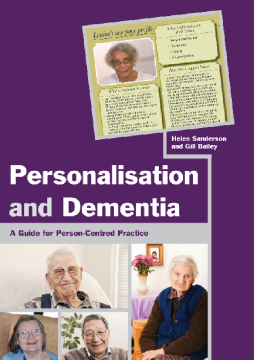
Additional Information
Book Details
Abstract
Personalisation builds on person-centred care to focus on how people with dementia can have more choice and control over decisions affecting them, and be supported to be part of their communities.
This practical guide explains how to deliver personalised services and support for people with dementia through simple, evidence-based person-centred practices. The authors clearly explain personalisation and current person-centred thinking and practice, providing many vivid examples of how it has been achieved in community as well as residential care settings. They guide the reader through using a range of person-centred practices. Strategies for ensuring a good match between the person with dementia and the staff and volunteers supporting them are also described. In the final chapter, the reader is introduced to Progress for Providers, a photocopiable tool for tracking progress in delivering appropriate personalised support for people with dementia living in care homes.
This is essential reading for dementia care practitioners and managers, as well as social and health care workers, community workers and students.
A refreshingly readable book, feels and looks like a text book but reads like a supportive coaching manual. Very in-depth but that doesn't distract from the clarity of the writing style... Too many highlights really including - "one-page profiles", "personalisation" and "person centred practices" because they have resonance across all spheres of Nursing. They make you sit up, think and reflect on your own work.
Chapter 5 "matching staff and clarifying responsibilities" is my highlight. Suggesting how matching staff characteristics with persons living with dementia, develops a win-win relationship... I would like to see everyone involved in elder care have access to a copy of this book. That's not just care staff, but non-care support staff too. It will be appropriate across all levels of nursing from NVQ support staff to ward managers and service providers.
Nursing Times
Helen Sanderson is CEO of Helen Sanderson Associates (HSA) and Director Emeritus of the International Community for Person-Centred Practices. She has been closely involved in the development of person-centred thinking and planning in the UK over the last fifteen years. She is the author of A Practical Guide to Delivering Personalisation and Creating Person-Centred Organisations, both published by JKP. HSA's partnership with Borough Care Ltd and Stockport Council were runners up in the National Dementia Awards 2012 in the innovation category. Gill Bailey trained initially as a nurse and has worked with a range of providers and commissioning units across adult health and social care for over twenty-five years, and in the last ten years this has focussed on supporting people living with dementia. She is a Dementia Care Mapper, has a diploma in Dementia Studies and is studying for a master's degree in this area. She is currently working with providers to introduce Individual Service funds in residential and homecare services for people living with dementia.
The person-centred practices outlined in this book show how to deliver genuine personalisation, where what is important for the person is balanced with what is important to the person's wellbeing. It is about the stuff that makes a life worth living: each person as an individual with their own needs, wishes, and dreams to be recognised and met... In the current economic climate, it is even more important that we make sure personalisation is about real choice and service. It is not, and must not be seen as, a way of cutting funding. I therefore warmly welcome the timely publication of a book that seeks to ensure we always see the person and not the dementia .
from the Foreword by Jeremy Hughes, Chief Executive of the Alzheimer's Society
This is a really useful book. All those supporting people with dementia in their own homes or within care homes will find this helpful. The person-centred thinking tools prompt readers to see what is really important to help people live their lives. On the surface level the tools are a format for planning care delivery. They are deceptively simple. They are never more than one page long but on a deeper level they help caring staff ask the sorts of transformational questions that pinpoint what is really important for the person. The worked examples are very real and moving and underscore that this is not just a paper exercise. This is essential reading for all advocates of person-centred care.
Professor Dawn Brooker, Director of the University of Worcester Association for Dementia Studies
